
Twitter in the Westboro Baptist Church: free publicity or a savior?
Even the most hated family in America, according to the title of a Louis Theroux documentary, is aware of how to and able to reach out to people. Could this be the reason why they let Theroux into their lives, to spread their message through a documentary? As leaders of the Westboro Baptist Church, the Phelps family seeks to gain publicity for their beliefs. In the modern age, they have also taken to Twitter.
The Phelps family
Ever since the documentary The most hated family in America (2007) came out, the world became familiar with the Phelps family. Theroux followed the Phelps family for the first time in 2007, and four years later they met again (VPRO, 2019). If the Phelps family doesn’t ring a bell, maybe the Westboro Baptist Church does?
The Westboro Baptist Church (WBC) is an American old-school Baptist church founded by Fred Phelps with around 40 members. This is where the Phelps family comes in, as most of the members of the church in Topeka are relatives of the Phelps family. Fred Phelps was a leader to the church and a (great) grandfather to the family until he passed away in 2014. The Westboro headquarters are a residential neighborhood where all the members/family live together, on the west side of Topeka. The church has faced several accusations of brainwashing and has been criticized for being a cult (Wikipedia, 2019).
The Phelps family became famous for their pickets, which include inflammatory hate speech against the LGBTQ+ community, Catholics, Orthodox Christians, Muslims, Jews, and U.S. soldiers and politicians. You can often find them next to public roads, at funerals of veterans and celebrities, or at public events. You can recognize them by their large signs featuring hateful slogans. The Church has also made inflammatory statements like “thank God for dead soldiers”, “God blew up the troops”, and “God hates America” (Wikipedia, 2019).
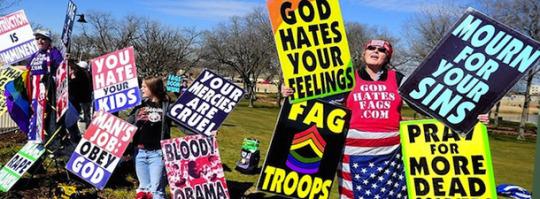
When it comes to keeping up with the modern age, the Westboro Baptist Church certainly doesn't lag behind. You can find everything you want to know about them on their official website www.godhatesfags.com. Their self-description found on the website is as follows:
“We adhere to the teachings of the Bible, preach against all forms of sin (e.g., fornication, adultery [including divorce and remarriage], sodomy), preach repentance and remission of sins in Christ’s name, and insist that the sovereignty of God and the doctrines of grace be taught and expounded publicly to all men.” (Westboro Baptist Church, n.d.)
The website also offers the opportunity to see their public preaching schedule (pickets), read several blogs about pickets in the past, and contact them. It really is an all-inclusive site that looks quite professional.
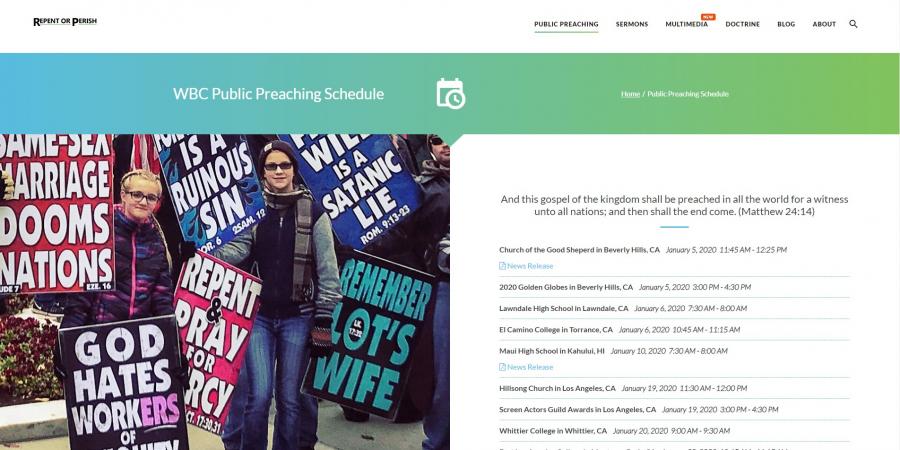
Members of the Church as deviants
We can view the Westboro Baptist Church as a social group, according to Becker’s (1966) Outsiders. They are a homogeneous whole with rules among them, which members must obey to belong in the group, or to become members at all. For example, given their view that "God hates fags", members of the Church cannot be homosexual.
In case of the Phelps family, one is automatically a member of the Church because they are not have a choice when they are born, but others from outside the community can also join them. Even someone born as a Phelps must still follow the rules of the Church, otherwise they can be rejected. The members of the WBC are seen as deviant by many, because they do not confirm to conventional norms/rules and the mainstream. For example, the embracement of people's differences is becoming mainstream practice today as there are wide movements to fight discrimination on the basis of race, gender or sexual orientation. We can look at events like national "coming out" days, where people celebrate being different (Duits, 2017). Therefore, the message of the WBC appears out of place when compared to mainstream discourses of inclusivity: it appears to fall outside the times.
In order to be a member of the Church, there are certain behavioral rules one must actively obey, such as going to church every Sunday, attending picket demonstrations. In another example, girls cannot seek the attention of boys, as covered in Theroux’ documentary. Following these norms, or in other terms, doing this kind of identity work amounts to a discursive orientation towards a set of features that are seen as emblematic of particular identities (boyd, 2014). In this case, the identity of a WBC member.
Westboro members forming a community on Twitter
Theroux' documentary shows that despite the fact that the Westboro Baptist Church is firmly convinced of what they stands for, they are also aware that there are not many proponents of what they view as normal. They admit as much on their website:
“Although these doctrines are almost universally hated today, they were once loved and believed. Even though the awful, destructive, sin-encouraging lies that "God loves everyone" and "Jesus died for everyone" are being taught from nearly every pulpit in this generation, with no focus on the wrath, holiness, and judgment of God, this hasn't always been the case. If you are in a church that supposedly believes the Bible, and you are hearing these lies, then your church doesn't teach what the Bible teaches.” (WBC, n.d.)
“Although these doctrines are almost universally hated today, they were once loved and believed.”
It is hard for a church whose views don't have many proponents to find new members. For this reason, the WBC must rethink the old-fashioned ways of recruiting new members, and take their recruitment action online. The platform that is particularly popular amongst members of the Church is Twitter. There, they can form an active online community, where they spread tweets with facts about the church, they respond to what is going on today, and they are completely honest about where they stand on certain topics and happenings. They also use every possibility to share articles about their Church. The majority of these articles are negative, but they don’t seem to care about the stance taken in the articles, as they mostly care about the amount of publicity.
Below are screenshots of three different Twitter accounts' posts, all belonging to members of the WBC. The first one, @GodH8sMedia, is sharing an article about a picket that a news site paid attention to. The second one, @AliWBC, is sharing a post about Christmas, and why they think it is a filthy lie. The last one, by @WBCRachel, is a response to a tweet by The Washington Post reporting on a deadly shooting that struck the Jewish community in Jersey City. @WBCRachel responds with a tweet accusing the Jews of killing Jesus Christ.
Digital media used for recruiting: No such thing as bad publicity
Betty Phelps, the mother of the Phelps family, is also active on Twitter. Taking a look at her Twitter account @BettyWBC, one can see how she uses Twitter to spread out her and the Church’s message. We can see that she is not bothered by what is said online about the Church or its members. She only sees the number of views their mention gets. Betty Phelps does not care about what is said online, but she has eye out for how many people see the Church's message.
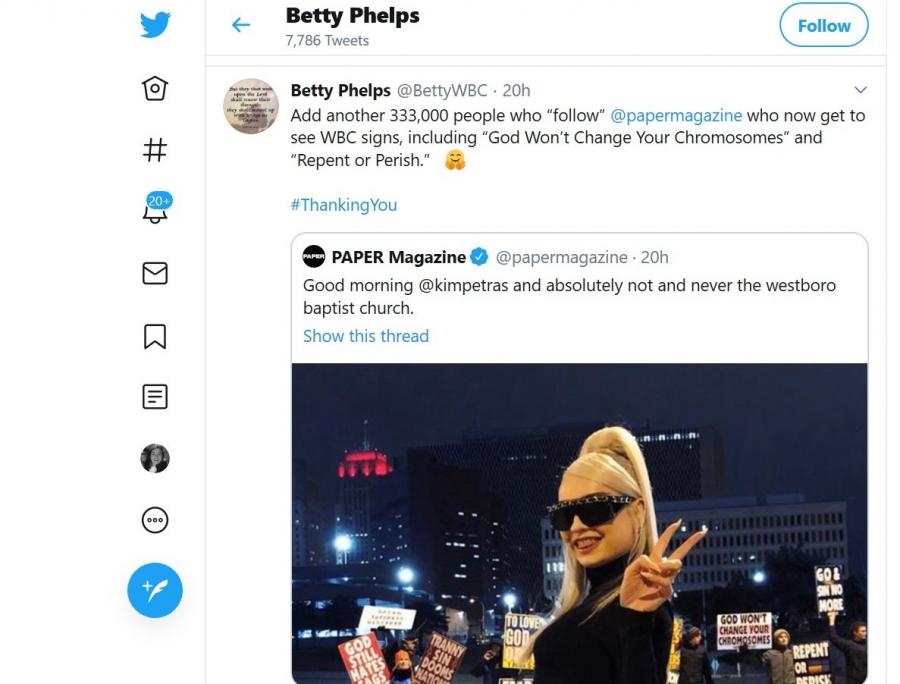
This is also the case in the tweet above. The Westboro Baptist Church organized a picket outside a Kim Petras concert in Kansas City. Petras, a German transgender popstar, responded to their presence by posing in front of the picket and posting a photo of this on her Instagram page with the caption "update. hoes still mad…", which was received as "hilarious" and "legendary" in the comments section. The post received 192,000 likes and over 8,000 comments, while Kim herself has over 475,000 followers. Of course, all her followers are in favor of Petras' action, but at the same time this makes them lend attention to the WBC. And it might just be the case that among the hundreds of thousands of people online that this picture reaches through various means, some will find the Church's message enticing.
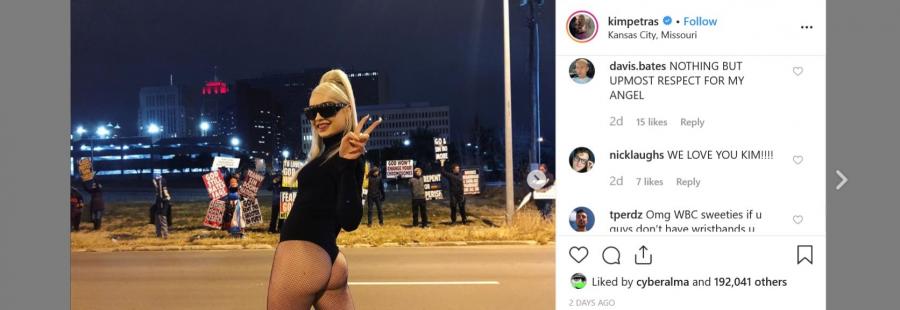
The family appears to know how to go viral, or anyway it looks like it. This was also a big reason why they gave Louis Theroux the opportunity to make a documentary about them and their beliefs. As they say in the documentary, Theroux gave them the opportunity to talk about the Church and reach the world with their message. And that is exactly what happened as Theroux' documentary went all around the world, and was shown on TV in various countries including Russia, Australia, and The Netherlands. Only in the UK, it garnered over 3.3 million views (IMDB, 2007).
These instruments together, Twitter and various social media, their website, TV, can enforce the globalization of the Westboro Baptist Church. There is no such thing as bad publicity. They are certainly aware of the fact that almost everyone is against them. But if they can reach a lot of people, there must be a few individuals who do feel addressed by their narrative. And every individual is an asset for the church.
As described in the previous paragraphs, the Westboro Baptist Church is aware of the times we live in today, where the online world is playing a big role. They have an official website, and they are no stranger to social media. Looking at their behavior online shows that they are aware of the fact that they can reach people through online platforms.
How Twitter helped former members leave the Church
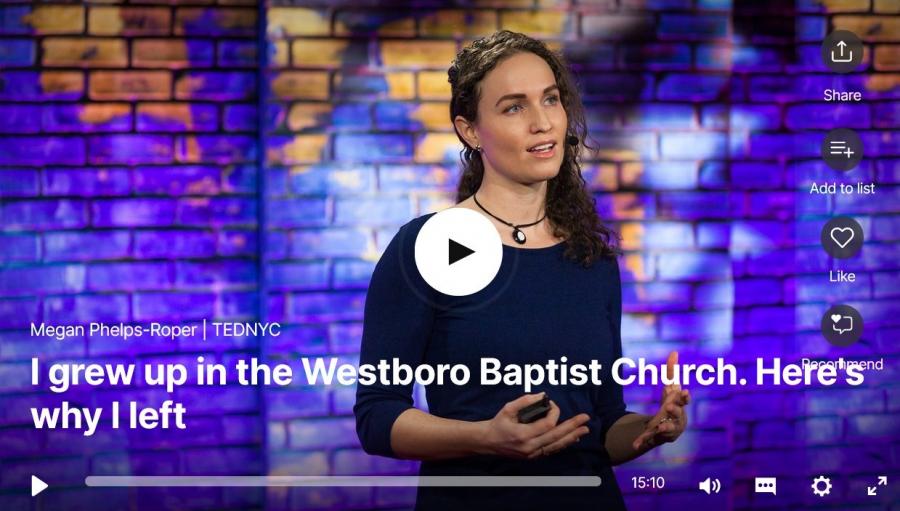
A former member of the Church who used social media as a tool for other purposes is Megan Phelps-Roper. Megan became famous through a TED Talk, in which she spoke about leaving the Church (Phelps-Roper, 2017) Megan shares details of life inside America’s most controversial church and describes how conversations on Twitter were key to her decision to leave the church:
“The end of my career in anti-gay pickets and life as I knew it, 20 years later, was partly caused by strangers on Twitter, who taught me the power of dealing with others. The line between friend and foe became more and more blurred, they saw each other as human beings and it changed the way we spoke to one another, these conversations planted seeds of doubt.” (Phelps-Roper, 2017)
One of the first people she spoke to online was David, a Jewish man from the US. The two got to talking for a long time and while it was always generally civil conversation with genuine interest from both sides, the arguments were heated. At some point, David went see Megan at one of the pickets. Quite striking, considering that the members of the Church also organize pickets against Jews.
“The end of my career in anti-gay pickets and life as I knew it, 20 years later, was partly caused by strangers on Twitter, who taught me the power of dealing with others.”
Megan's Twitter behavior changed over time. At first, she spearheaded Westboro’s push into the social-media age, using Twitter to offer a window into life in the Church and to give it an air of accessibility (Chen, 2015). The fact that you can only include 140 characters in a tweet made Megan think carefully about what she wanted to tweet. So, instead of moving spreading hate from an offline environment to an online one, she started to tweet about the Church and that’s where the conversation with others started (Phelps-Roper, 2019). In the tweets below, you see Megan openly talking about her experience on Twitter after she had left the Church, and about how she still loves her family very much and wants them to experience the same as her.
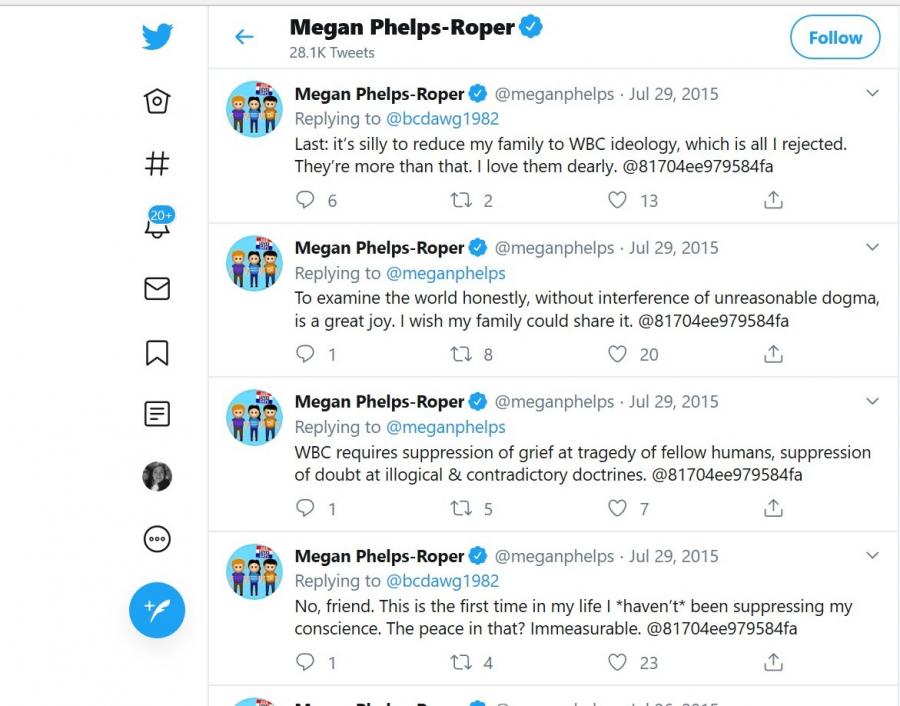
In her Ted Talk, Megan says something remarkable: "I started to feel like I was becoming part of this community on Twitter. And that was the first time that I really felt ashamed of what I was doing." She does not mean the Westboro community on Twitter, but a community of people who shared their opinions openly, and most importantly, treated each other with respect. People like David.
Unfollow
Megan wrote a book about her story, titled Unfollow, a Journey from Hatred to Hope, Leaving the Westboro Baptist Church. Unfollow related Megan’s moral awakening, her departure from the Church, and how she exchanged the absolutes she had grown up with for new forms of warmth and community. It exposes the dangers of black-and-white thinking and the need for true humility in a time of angry polarization (Phelps-Roper, 2019).
What is striking about Megan’s Twitter behaviour is that she still tries to reach out to her family through the medium. When she left the community, she knew she would never talk to her family again. But she doesn’t hold any grudge against them for not talking to her anymore. In contrast, Megan says in an interview with NPR:
“Shortly after my sister and I left, we realized pretty quickly, we have nothing to lose, and we have nothing to gain by following those rules. We have nothing to lose by reaching out to them.”
Although Megan left the church voluntary, she still misses her family every day. She also makes it clear that the church is not a cult because this voluntary way out exists for members; her family would have even helped her pack if she liked (Shaitly, 2016).
Twitter: saving existing members or recruiting new ones?
In short, Twitter plays a massive role in this story as a tool for serving various motives. Betty Phelps only sees views, likes, and reactions, and it does not bother her if they are negative or positive, as long as as many people as possible see something about the Westboro Baptist Church.
In case of Megan, who found an answer to a lot of questions on Twitter, the medium was where she started doubting the Church. Thanks to conversation with strangers who were kind to her on Twitter, she began to question the WBC, which led up to her leaving it. Now, she uses Twitter as a tool to talk about the Church and to address her family with messages of hope and love.
So, social media, in this case Twitter, has two roles in this story. On the one hand, it can be a tool for free publicity. Whether it is bad or good, it is still publicity that counts for the Westboro Baptist Church. And on the other hand, it is a tool to discuss with others about the Church, which led to Megan leaving.
It is debatable if social media has a positive or negative effect for the WBC. When you think of Megan, if she hadn't met others on Twitter or read stories online, maybe she would still be a member of the Church. This might differ for other members, and it is not certain that this function outweighs the publicity that social media can provide for the WBC, and publicity can bring in new members.
References
Becker, H. S. (1966). Outsiders. New York: The Free Press, New York. Retrieved December 4, 2019
boyd, d. (2014). It's complicated. Retrieved December 4, 2019
Dube, R. (2009, October 7). How to handle hate Jews debate response to the WE. Retrieved December 3, 2019, from Forward: https://forward.com/news/116261/how-to-handle-hate-jews-debate-response-...
Duits, L. (2017). Hoe queer ons afhelpt van hokjesdenken over seksualiteit indentiteit en gender. Retrieved Januari 2, 2020, from Brainwash: https://www.brainwash.nl/bijdrage/hoe-queer-ons-afhelpt-van-hokjesdenken...
Petras, K. (2019, December 1). @Kimpetras. Retrieved December 4, 2019, from Instagram: https://www.instagram.com/p/B5jT6cMFWF9/
Phelps-Roper, M. (2017, February). I grew up in the Westboro Baptist Church. Here's why I left. TEDNYC. Retrieved December 3, 2019, from https://www.ted.com/talks/megan_phelps_roper_i_grew_up_in_the_westboro_b...
Chen, A. (2015, November 15). Unfollow. The New Yorker. Retrieved December 5, 2019, from https://www.newyorker.com/magazine/2015/11/23/conversion-via-twitter-wes...
IMDb. (2007, April 1). The most hated family in America. Retrieved December 5, 2019, from IMDB: https://www.imdb.com/title/tt1000764/
Phelps-Roper, M. (2019, November 12). Escaping the Westboro Baptist Church (Megan Phelps-Roper Interview). (D. P. Show, Interviewer) Retrieved December 4, 2019, from https://www.youtube.com/watch?v=XvkDFD3tQG0
Roper-Phelps, M. (2015, July 29). @meganphelps. Retrieved December 5, 2019, from Twitter: https://twitter.com/meganphelps?lang=en
Shaitly, S. (2016, April 10). Losing my religion: life after extreme belief. The Guardian. Retrieved December 5, 2019, from https://www.theguardian.com/world/2016/apr/10/losing-my-religion-life-af...
Phelps, B. (2019, December 2). Retrieved December 3, 2019, from Twitter: https://twitter.com/BettyWBC/status/1201317260633227264
Phelps-Roper, M. (2019). Unfollow: A journey from Hatred to Hope. Goodreads. Retrieved December 3, 2019, from https://www.goodreads.com/book/show/43314707-unfollow
Shaitly, S. (2016, April 10). Losing my religion: life after extreme belief . The Guardian. Retrieved December 5, 2019, from https://www.theguardian.com/world/2016/apr/10/losing-my-religion-life-af...
VPRO. (2019, October 18). Most hated family in America. Retrieved December 3, 2019, from VPRO: https://www.vpro.nl/programmas/louis-theroux/most-hated-family-in-americ...
Westboro Baptist Church. (n.d.). Retrieved December 4, 2019, from Tumblr: https://www.tumblr.com/tagged/westboro-baptist-church
Westboro Baptist Church. (n.d.). AboutWCB. Retrieved December 4, 2019, from Godhatesfags: http://www.godhatesfags.com/wbcinfo/aboutwbc.html
Wikipedia. (2019, November 21). Westboro Baptist Church. Retrieved December 4, 2019, from Wikipedia: https://en.wikipedia.org/wiki/Westboro_Baptist_Church